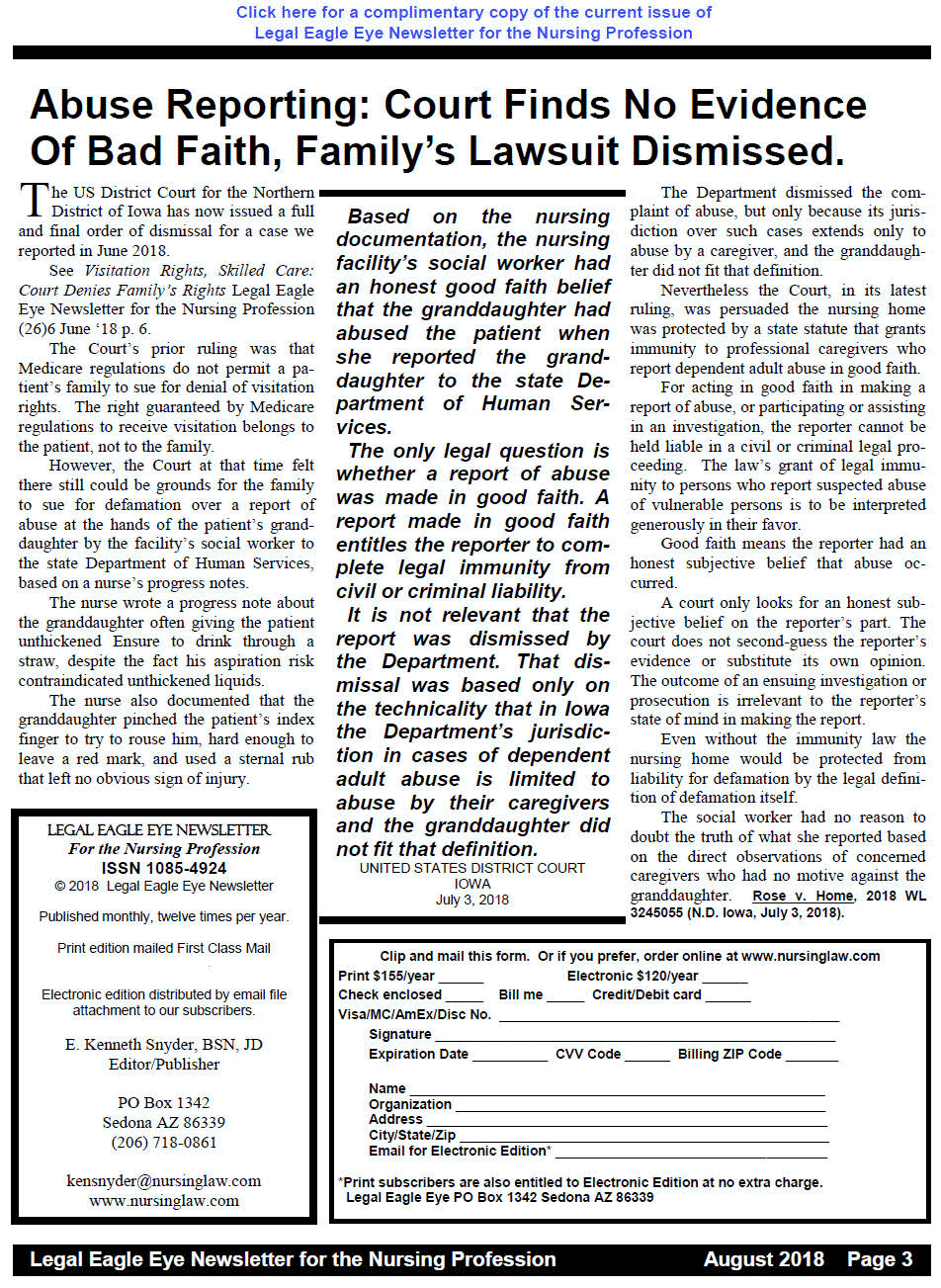 Abuse Reporting: Court Finds No Evidence Of Bad Faith,
Family’s Lawsuit Dismissed.
Abuse Reporting: Court Finds No Evidence Of Bad Faith,
Family’s Lawsuit Dismissed.  Abuse Reporting: Court Finds No Evidence Of Bad Faith,
Family’s Lawsuit Dismissed.
Abuse Reporting: Court Finds No Evidence Of Bad Faith,
Family’s Lawsuit Dismissed. Based on the nursing documentation, the nursing facility’s social worker had an honest good faith belief that the granddaughter had abused the patient when she reported the granddaughter to the state Department of Human Services.
The only legal question is whether a report of abuse was made in good faith. A report made in good faith entitles the reporter to complete legal immunity from civil or criminal liability. It is not relevant that the report was dismissed by the Department. That dismissal was based only on the technicality that in Iowa the Department’s jurisdiction in cases of dependent adult abuse is limited to abuse by their caregivers and the granddaughter did not fit that definition.
UNITED STATES DISTRICT COURT IOWA July 3, 2018The US District Court for the Northern District of Iowa has now issued a full and final order of dismissal for a case we reported in June 2018. See Visitation Rights, Skilled Care: Court Denies Family’s Rights Legal Eagle Eye Newsletter for the Nursing Profession (26)6 June ‘18 p. 6.
The Court’s prior ruling was that Medicare regulations do not permit a patient’s family to sue for denial of visitation rights. The right guaranteed by Medicare regulations to receive visitation belongs to the patient, not to the family.
However, the Court at that time felt there still could be grounds for the family to sue for defamation over a report of abuse at the hands of the patient’s grand-daughter by the facility’s social worker to the state Department of Human Services, based on a nurse’s progress notes. The nurse wrote a progress note about the granddaughter often giving the patient unthickened Ensure to drink through a straw, despite the fact his aspiration risk contraindicated unthickened liquids. The nurse also documented that the granddaughter pinched the patient’s index finger to try to rouse him, hard enough to leave a red mark, and used a sternal rub that left no obvious sign of injury.
The Department dismissed the com-plaint of abuse, but only because its jurisdiction over such cases extends only to abuse by a caregiver, and the granddaughter did not fit that definition. Nevertheless the Court, in its latest ruling, was persuaded the nursing home was protected by a state statute that grants immunity to professional caregivers who report dependent adult abuse in good faith.
For acting in good faith in making a report of abuse, or participating or assisting in an investigation, the reporter cannot be held liable in a civil or criminal legal proceeding. The law’s grant of legal immunity to persons who report suspected abuse of vulnerable persons is to be interpreted generously in their favor. Good faith means the reporter had an honest subjective belief that abuse occurred. A court only looks for an honest subjective belief on the reporter’s part. The court does not second-guess the reporter’s evidence or substitute its own opinion. The outcome of an ensuing investigation or prosecution is irrelevant to the reporter’s state of mind in making the report.
Even without the immunity law the nursing home would be protected from liability for defamation by the legal definition of defamation itself. The social worker had no reason to doubt the truth of what she reported based on the direct observations of concerned caregivers who had no motive against the granddaughter. Rose v. Home, 2018 WL 3245055 (N.D. Iowa, July 3, 2018).
More references from nursinglaw.com
http://www.nursinglaw.com/abuse-reporting-nurse.htm
http://www.nursinglaw.com/abuserpt.htm
http://www.nursinglaw.com/abusereport.htm
http://www.nursinglaw.com/abuse-patient.htm